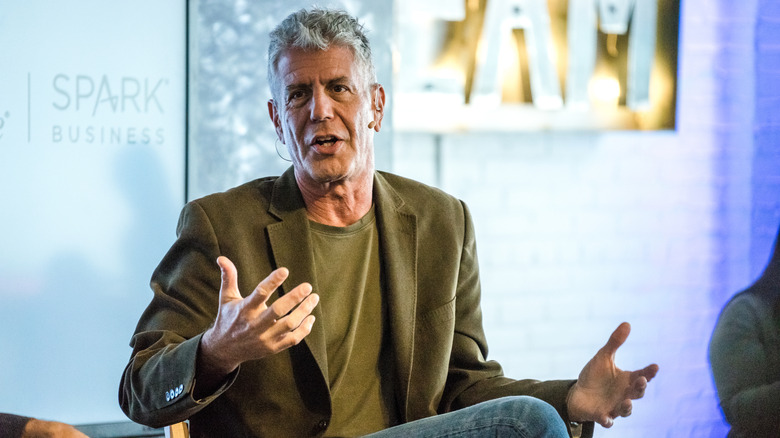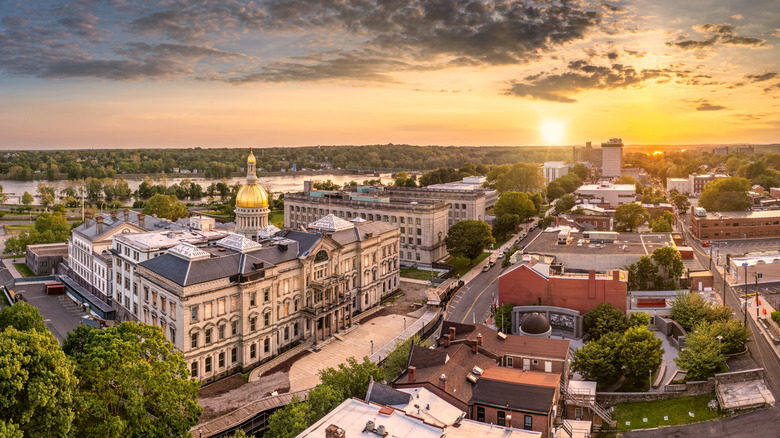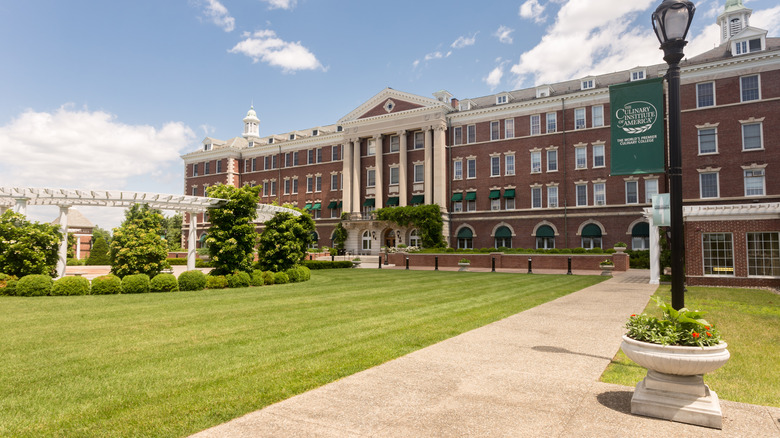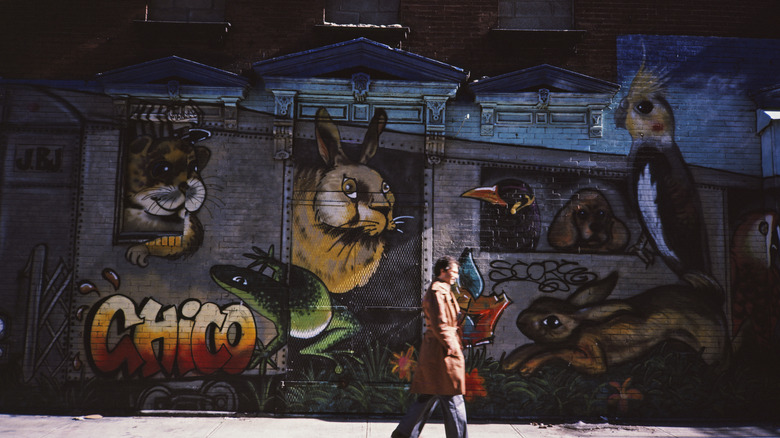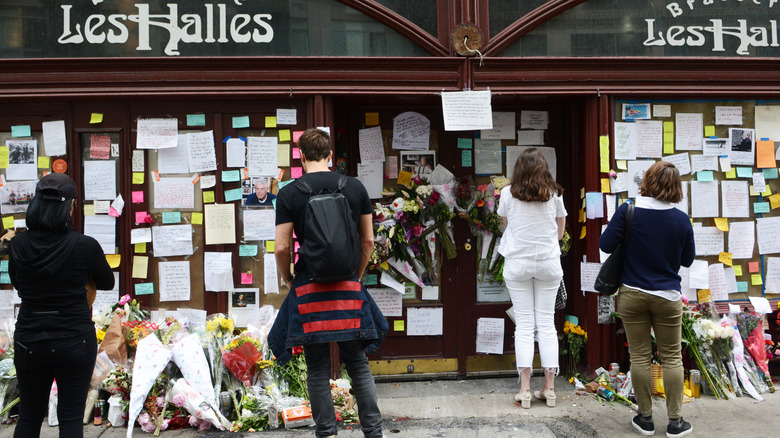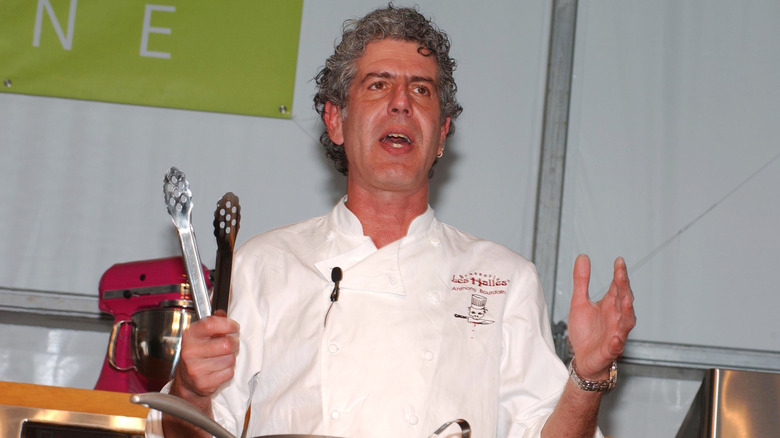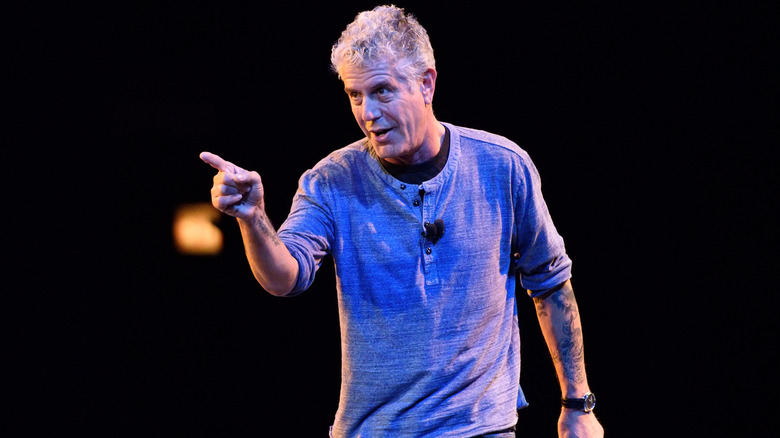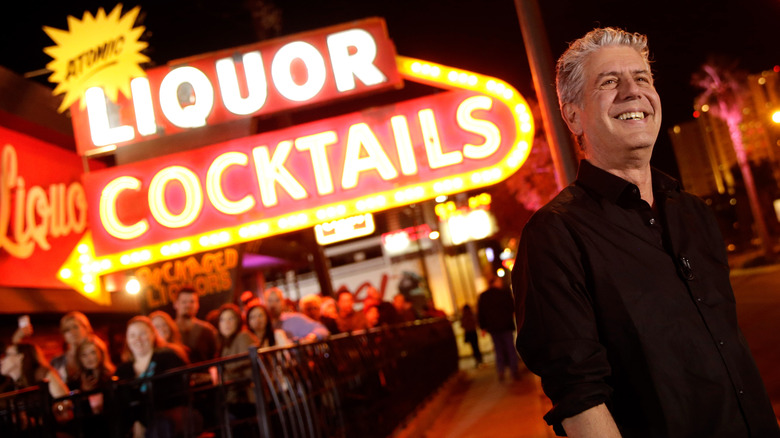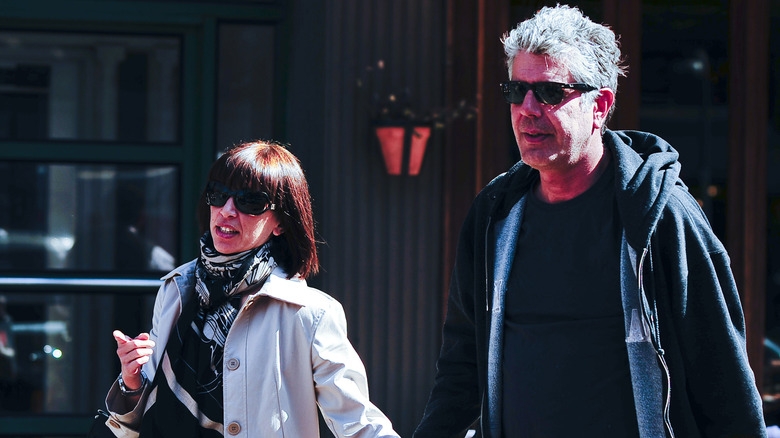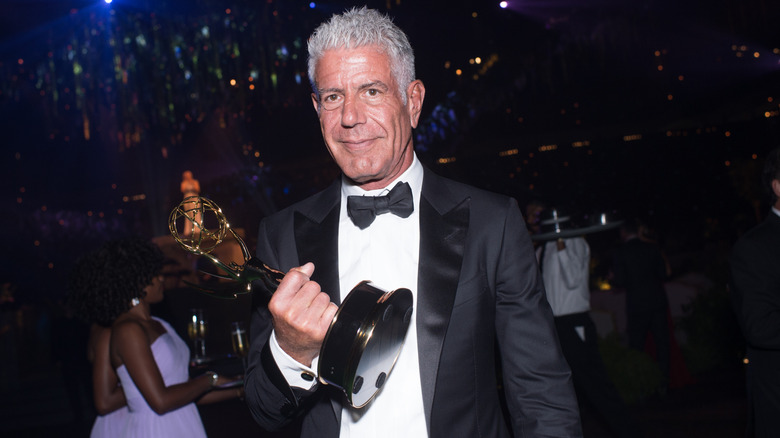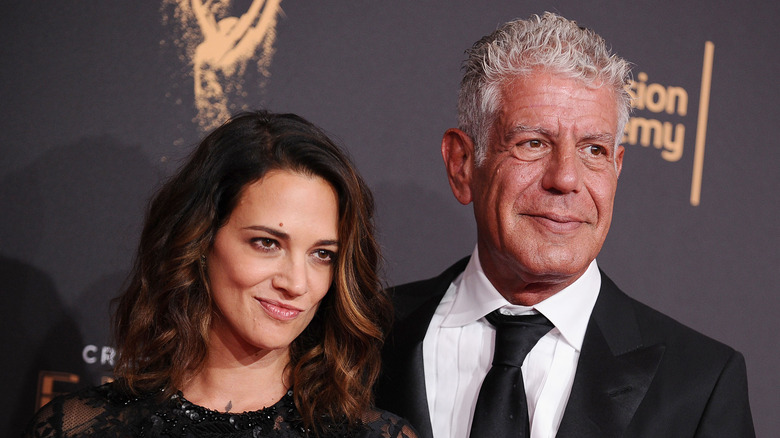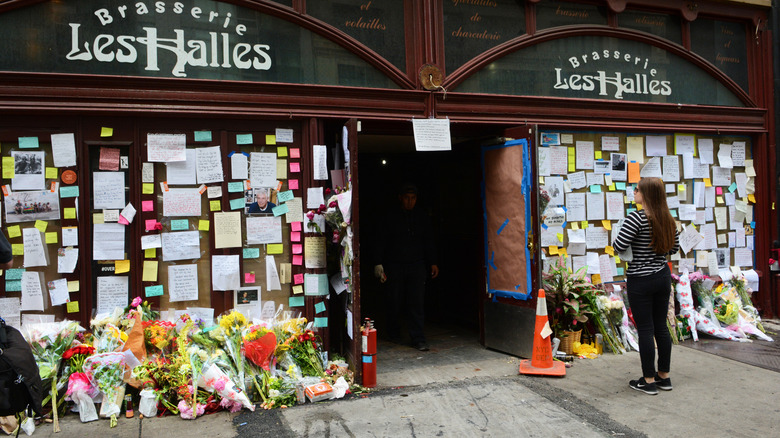Inside The Tragic Life Of Anthony Bourdain
Anthony Bourdain was a unique personality who combined raw charm with a passion for food and travel that has rarely been matched. In public, he led a life of adventure, sensory indulgence, and exploration. In private, he battled addiction and suffered from depression and bouts of psychotic rage. As an author, he stood at the forefront of the burgeoning foodie culture of the early 21st century. As a documentarian, he became synonymous with the movement itself.
Bourdain's natural irreverence and acidic wit certainly made for compelling viewing. But it was his blistering honesty — first revealed to the public at large via The New Yorker expose of the dark corners of the culinary world – that helped cement his place as one of gastronomy's most important voices.
His travel shows were watched by millions, won multiple Emmys, and were hard to pigeonhole. He was quick to highlight locations that he thought flew under the radar and never shied away from the unusual or exotic when it came to sampling local cuisine. Part travelogue, part journalism, and riddled with seemingly endless lunches, brunches, and dinners, Bourdain viewed his television work as an opportunity to wax lyrical about his principal love: food, and the joy of eating it in good company.
Still, all the success, fame, and money could not completely subdue some of the demons that had plagued his life from an early age. Bourdain often spoke candidly about his struggles with addiction and his later battles with clinical depression. Nevertheless, his tragic suicide in June of 2018 at the age of just 61 shocked the world and marked the concluding chapter in the tragic life of Anthony Bourdain.
Early Life
Anthony Bourdain was born June 25, 1956, in New York City but grew up in New Jersey. His father, Pierre Bourdain, was a music executive whose first language was French. From an early age, Pierre impressed upon his son the importance of food as a shared experience. Bourdain would later reflect on lessons learned at the French brasserie his father favored, noting that, " He taught me early that the value of a dish is the pleasure it brings you; where you are sitting when you eat it—and who you are eating it with—are what really matters."
Such trips to France were a regular occurrence — Bourdain would later speak passionately of his favorite Parisian Restaurant – and he soon learned to treat everywhere he went as an opportunity to try new things. He delighted in the simplicity of Jersey cuisine, enjoying the lack of pretension found in Italian, Jewish, and Chinese staples. However, he never allowed familiarity to dissuade him from trying more exotic fare. Indeed, he discovered sushi at just 14, many years before it had penetrated the zeitgeist and during an era when few people experimented with anything outside their wheelhouse. He would travel to Manhattan to visit old-school French bistros and sample unfamiliar dishes: German sausage, smorgasbord, and colorful Cantonese food.
Bourdain met his future wife, Nancy Putkoski, at High School. A year older than him and allegedly part of a bad crowd, Bourdain was so smitten with Putkoski that in 1973, he graduated early just so he could follow her to Vassar College. In doing so, he became one of the first men to attend the historically all-female university. Two years later, he dropped out.
Dropping out
It was love that drove Anthony Bourdain to enroll at Vassar College, but it was his love of food that ultimately forced him to abandon the place. His father's love of the culinary arts had made enough of an impact on him that he found summer work as a dishwasher and later worked at various seafood restaurants around Massachusetts doing every possible job imaginable.
He began experimenting with drugs during this stage of his life, although specific dates are hard to pin down. Certainly, Bourdain's experience working in kitchens rubbed off on him – an industry that has long been associated with substance abuse – although Bourdain never blamed his time spent there for his subsequent addictions.
In the kitchens, he learned how to work with others, the importance of punctuality, and how to treat superiors with respect. Still, after only two years at Vassar, he dropped out, ostensibly to pursue a career in the food industry. Realizing the need for more formal training if he were ever to rise to the top, Bourdain returned to familiar stomping grounds, enrolling in the Culinary Institute of America.
Graduation, death, and addiction
In 1978, Anthony Bourdain graduated from the Culinary Institute of America. Just two years later, he bought his first bag of heroin.
He had been struggling to make his mark in the restaurant industry, and the grueling pace of work was already beginning to take its toll. By all accounts, Bourdain was an average line chef at best; his dalliance with hard drugs certainly did not help. At some point, he made the switch from heroin to crack cocaine, noting that at his lowest point, he would "comb the shag carpet for paint chips in the hope that they were fallen crack bits, smoking them anyway."
He quit using drugs shortly after his father died of a heart attack at 57. "I was shucking oysters at a raw bar in the Village when he died," Bourdain wrote some years later via The Guardian, noting that he thought about it a lot and obsessed about how he saw his father's face in his own with the passing of the years.
Kitchen work and the last refuge of the misfit
Anthony Bourdain's decade of work as a dishwasher, prep cook, and sous chef eventually earned him the right to run his own kitchens in New York — and he floated from job to job, creating an eclectic resume along the way. He gained invaluable experience at familiar eateries across the city, including the Rainbow Room, The Supper Club, and Coco Pazzo Teatro, keeping his eyes and ears open to the absurdity of it all.
Despite the work, his finances were in disarray — Bourdain did not even qualify for a credit card during this time — and up until the age of 44, he had no savings. He was spending all his money on drugs and luxury vacations to the Caribbean, with little thought given to the future. In an article published in The Guardian in 2017, Bourdain described himself during this period as an unhappy soul. He said, "I hurt, disappointed and offended many, many, many people and I regret a lot." Bourdain felt a deep sense of shame.
Still, his years of hard work paid off, and in 1998, he became executive chef of Brasserie Les Halles, a restaurant on Park Avenue South. His day would begin around 6 a.m.; he would obsess about specials en route to work, don clogs when he got there, and prep for service listening to the Dead Boys playing Sonic Reducer. Work would continue until well after midnight, and Bourdain settled into a life of endless rinse and repeat.
During this time, he perfected what he would later describe as genius cooking tips, cementing his reputation as a chef of considerable talent. He remained chef at large at Les Halles until the establishment closed its doors for the last time in 2017.
The first glimpse of success
Anthony Bourdain had always fancied himself as something of a writer. His first published book — "Bone in the Throat: A Novel of Death and Digestion" — came out in 1995. It was quickly followed by two others, "Gone Bamboo" and "The Bobby Gold Stories."
However, it was his intimate knowledge of restaurant work that first drew attention to his unorthodox style of storytelling. In 1999, The New Yorker published a Bourdain-penned article titled Don't Eat Before Reading This. Part attack on (and part love letter) to the restaurant industry, Bourdain's inimical style combined dry humor with — at times — shocking levels of candor. He reveled in a near-contempt for the customers who kept his restaurant afloat, scoffed at preconceived notions of cleanliness, and proffered a raw honesty when it came to the nuts-and-bolts mechanics of running a restaurant.
The article became something of an overnight phenomenon as readers expressed a morbid fascination with the grimy, hidden depths of the restaurant industry. Suddenly, the name Anthony Bourdain was on everybody's lips.
The culinary underbelly and literary careers
Anthony Bourdain followed up his The New Yorker debut with an expanded look at the life of a busy New York restaurateur. Released in 2000, "Kitchen Confidential: Adventures in the Culinary Underbelly" offered yet more candid accounts of the dysfunctional workings of New York City eateries. However, the expanded word count also provided him the space to share more intimate details of his life and how it had shaped him as a chef. He was, if anything, even more blunt about his own personal shortcomings than he was about the industry he so clearly adored. With seeming relish, Bourdain detailed his early life and spoke frankly about his struggles with addiction.
As the limelight beckoned and the potential for lucrative television work loomed, it seemed as if all of Bourdain's problems, both personal and financial, had been solved. But his wife, Nancy Putkoski, waxed polemical on the issue. She saw television work as a threat to their marriage. Indeed, according to Bourdain, she saw the whole thing as a cancer waiting to happen.
The bad boy of gastronomy
Kitchen Confidential's critical and commercial success cemented Anthony Bourdain as a media personality with a bright future — in 2002 he starred in his first show, "A Cook's Tour," which ran for two seasons.
The formula was one that would soon become familiar. Bourdain traveled around the world sampling food, embracing the joie de vivre with his arms spread wide, a sardonic sense of devil may care, and his by now signature disrespect for television norms.
Despite having successfully quit drugs in the 1980s, Bourdain had never stopped drinking and would continue to drink heavily until his death in 2018. This self-destructive behavior was on display from the get-go. Bourdain would drink on camera, often becoming intoxicated multiple times during a single episode. Such behavior was markedly unprofessional, but, here it lent credence to the idea that Bourdain leaned into his maverick character so heavily that an anything goes mentality permeated.
The show was a hit, and the Bourdain family's financial problems were now a thing of the past, yet he seemed to find little satisfaction in his elevated status. At home, things were deteriorating. His wife had little love for the newfound fame. The show also took him away from home for extended periods, further complicating his home life.
In 2005, his wife's prediction came true. The marriage broke down, and the couple divorced. Bourdain threw himself into his new role as a media personality and began work on a second television show even as the attorneys were finalizing the divorce.
Network Success
In 2005, the first season of "Anthony Bourdain: No Reservations" aired to rave reviews. The formula was by now synonymous with Bourdain himself. He would travel the world, sampling local cuisine while enthralling the audience with his signature style of presentation. The title said it all. His lack of restraint when it came to both the food he ate and the views he espoused was as refreshing as it was hard to pigeonhole; this was a show as much about Bourdain's personality as it was about the places he visited.
Both on camera and behind the scenes, Bourdain continued to drink heavily, juggling his twin roles as a media icon and executive chef at his beloved Les Halles restaurant. Still, he refused to put his personal life on hold. Even as he waxed lyrical about his favorite cocktail or enthused over his latest culinary discovery, Bourdain continued to seek happiness and create a life for himself off-screen.
In 2007, he married again, this time to Ottavia Busia, a mixed martial arts fighter who he had been dating for some time. That same year, Busia gave birth to Bourdain's first and only child, a daughter, Ariane Busia-Bourdain. Fatherhood, it seemed, had a profound impact on Bourdain. In his 2016 book "Appetites: A Cookbook," he wrote, "From the second I saw my daughter's head corkscrewing out of the womb, I began making some major changes in my life. I was no longer the star of my own movie — or any movie. From that point on, it was all about the girl."
Second Marriage and divorce
It seemed there were no limits to the heights of Anthony Bourdain's career. "No Reservations" ran for an incredible nine seasons, picking up two prime-time Emmys along the way and granting Bourdain international name recognition. The show remained unapologetic about its love of food and travel; Bourdain was more than happy to introduce readers to exotic fine dining delicacies and then pivot to his favorite fast-food items within a single episode.
Behind the scenes, however, things began to unravel. The show kept him on the road year after year and he entered an endless cycle of packing and unpacking with regular dad duties sandwiched in between. As the last season of "No Reservations" drew to a close, Bourdain was already working on his next big hit, "Parts Unknown," which ran from 2013 to 2018. The hectic schedule began to take its toll. He would eat his way through Iran and Libya, then rush to the local Popeye's as soon as he got home. No longer a young man, Bourdain admitted in People that the schedule could be grueling — he said about the crew, "They try not to beat up on me and not schedule two big eating and drinking scenes in one day."
In 2016, he and Ottavia separated, marking Bourdain's second failed marriage. Despite the fact that the divorce had not been finalized, Bourdain began to date other people, most notably Dario Argento's daughter, Asia Argento. Still, he seemed unable to find happiness anywhere.
Depression
According to Charles Leerhsen's unauthorized biography "Down and Out in Paradise: The Life of Anthony Bourdain," the world-famous celebrity chef and raconteur was suffering from severe depression toward the end of his life. He described a man who had become distant from those he most cared about, someone who had alienated friends, was not on the best of terms with his mother and brother, and was only sporadically engaged with his daughter's life.
The book proved controversial. Bourdain's brother Christopher dismissed it as fiction, saying it was malicious, while others conceded that at least some aspects of it rang true. Regardless, it seems clear that toward the end, Bourdain found himself locked into a downward spiral.
His relationship with Asia Argento was a tumultuous one. Twenty years his junior, Bourdain struggled to keep up with her, allegedly resorting to the use of steroids while continuing to get blackout drunk on a near-daily basis. Indeed, according to Leerhsen's book, in a text message to his ex-wife Ottavia, Bourdain lamented, "I hate my fans, too. I hate being famous. I hate my job. I am lonely and living in constant uncertainty." Infidelity rocked the relationship from time to time, and it seems that Bourdain's discovery of photos of Asia dancing with journalist Hugo Clément in Rome served as a catalyst for what came next.
To parts unknown
On June 8, 2018, Anthony Bourdain was staying at Le Chambard Hotel in Kaysersberg-Vignoble, France, where he and his crew had been shooting an episode of "Parts Unknown." When Bourdain didn't show up for dinner that night, fellow chef Éric Ripert went up to his room to investigate. Sadly, he was too late. Bourdain had hanged himself.
Texts unearthed in Charles Leerhsen's book indicated just hours before his death, a back-and-forth argument with Asia Argento took place, with Bourdain accusing her of having been reckless with his heart. The real reason for the much-loved chef's departure will never be known. Separated from, but still married to, his second wife, he left behind an 11-year-old daughter and a legacy of genuine brilliance marred with severe personal struggles.
Later, Argento would confirm that they had both cheated on one another but refuted the accusation that infidelity had led to his eventual death, noting in an interview for the Daily Mail that "'People say I murdered him. They say I killed him," before adding "But I understand that the world needs to find a reason. I would like to find a reason too. I don't have it." The pain Bourdain endured, however, was matched by the joy he brought to so many. His boundless enthusiasm, raw charisma, and refusal to compromise left us with a body of work that will long be remembered. As his achievements live on, Bourdain remains an inspiration to those of us who wish to enjoy life on our own terms.
If you or anyone you know are having suicidal thoughts, know that help is available. You are not alone. Please contact Silence of Suicide for more information.
